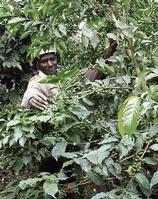
Maina Kimondo attends to his coffee plantation in Nyeri, 120 km (75 miles) north-west of the Kenyan capital Nairobi, in this September 9, 2006 file photo. Growing coffee for 20 years has not lifted 60-year-old Maina Kimondo from poverty. So talk of a new marketing system that could boost earnings fails to raise a spark in his eye.
Export of primary agricultural products is an important contributor to foreign exchange earnings in Jamaica and contributed US$104,298,000 to the economy in 2003. In 2003, agriculture contributed 6.3 per cent to Jamaican GDP, but between 1996 and 2000 contributed 7.0 per cent on average. When processed and value-added products are included, agriculture accounted for 21 to 23 per cent of the gross foreign exchange earned by the Jamaican economy from 1996-2000 .
Coffee is a traditional export crop (along with sugar, bananas, citrus and cocoa) that has been produced and exported from Jamaica from as early as 1737, nine years after its introduction to Jamaica. Coffee is grown virtually in every parish of Jamaica with the exception of Kingston (the capital and major urban centre). Jamaica Blue Mountain coffee is grown in three parishes - St. Andrew, St. Thomas, and Portland - while Jamaica High Mountain and Jamaica Prime (referred to collectively as lowland coffee), are grown in the remaining ten parishes.
High quality
Jamaica Blue Mountainª has developed a world-wide reputation as an excellent, well-balanced coffee and is sought after by discriminating coffee drinkers, primarily in Japan, but also in Europe and North America, and retails as one of the most expensive
coffees in the world. Lowland coffee grown in other areas of Jamaica is also of high quality and commands a higher price than coffees from other origins.
Coffee has replaced bananas (which have been steadily declining in earnings since 1998), as the highest value export crop. In 2000 the coffee industry earned 50 per cent more than bananas, thus making coffee a more reliable source of foreign exchange. Average coffee export earnings have been approximately US$28 million per year since 1998, but this varies according to weather conditions and quality of beans. In 2003/04, coffee earned US$22.33 million.
Vital to the economy
This industry is therefore of vital importance to the economy of Jamaica, and especially to the small rural farming communities. There are over 9,500 registered coffee farmers in Jamaica and the Coffee Industry Board (CIB) estimates a ten fold employment effect in field and processing operations. Using this estimate, coffee employs approximately 90,000 people. Approximately 80 per cent of persons employed in coffee are women, mostly engaged as reapers at the peak of the crop.
The reputation of Jamaican Blue Mountain Coffee as a gourmet product has helped to promote a favourable image of Jamaica abroad. To many
foreigners, particularly the Japanese, Jamaica is positively associated with Blue Mountain coffee, reggae and rum. Its relative scarcity compared to other coffees confers an air of mystique and it is highly sought after in local and overseas markets.
Blue Mountain coffee is a popular item purchased by tourists, and is an important element of the tourism product. Jamaican coffee has also generated many popular value-added products such as liqueurs, ready-to-drink beverages, confectioneries, baked products, 'coffee candles', and even tours of coffee farms and factories. Employment and earnings from Jamaican coffee are therefore much greater than available data suggests, and the positive image conferred on Jamaica by association is impossible to quantify.
- Coffee Industry Board

